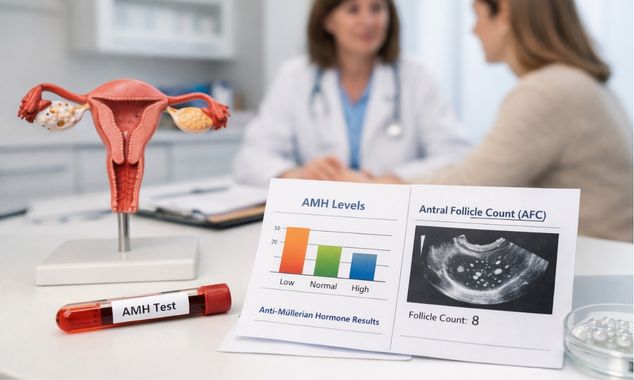Egg Reserve Tests Explained: What Does Your AMH and AFC Results Really Mean
Egg reserve tests such as AMH and AFC help assess egg quantity, not fertility potential. Learn what they mean and how they support fertility planning.

Maintaining a healthy body weight is not just about appearance or general wellness. Maintaining a healthy body weight plays a key role in optimal reproductive health and fertility for people of all genders. Whether you're planning to conceive naturally or with assistance, understanding how weight impacts fertility can help guide better decisions for your body and future family.
BMI, or Body Mass Index, is a commonly used measure to assess whether your weight is within a healthy range. A BMI between 18.5 and 24.9 is typically considered optimal for fertility. However, BMI does not tell the full story. Muscle mass, fat distribution, metabolic health, and individual variations should all be considered when evaluating fertility potential.
Our reproductive system is closely linked to our overall health, and body weight is one of the most influential factors. Both excess weight and being underweight can disrupt the hormonal balance necessary for healthy reproductive function.
Excess weight, particularly when it results in a high BMI can:
Being underweight can also negatively affect fertility:
Your weight not only affects your ability to conceive, but it can also influence your baby's health and development:
Improving your weight does not require drastic measures. Sustainable, safe, and supportive approaches are key:
Work with a healthcare provider to determine a healthy weight range based on your unique body composition and fertility goals. Even a modest weight loss of 5 to 10 percent can significantly improve fertility in those with higher BMI.
Focus on nutrient-dense foods that support hormone production and reproductive health:
Avoid restrictive or extreme diets, which can harm fertility. Instead, aim for sustainable eating habits.
Engage in physical activity that you enjoy. Regular moderate exercises improve metabolic health, reduces stress, and supports hormonal balance. Aim for at least 150 minutes of moderate-intensity activity per week, such as walking, swimming, or cycling.
Chronic stress can compound the effects of weight-related fertility issues. Practice stress-reducing techniques like mindfulness, yoga, deep breathing, or speaking with a therapist. Emotional wellbeing supports both physical health and fertility.
Poor sleep can disrupt hormone production and appetite regulation. Prioritising quality sleep (7-9 hours per night) can aid weight management and overall reproductive health.
Whether you're trying to gain weight, lose weight, or simply improve your overall health, professional guidance can make the journey safer and more effective. Support from fertility specialists, nutritionists, and counsellors can provide a comprehensive plan tailored to your needs.
At JIVA Fertility, we understand that every body is different. Maria Kolotourou, our specialist Dietitian-Nutritionist, can guide patients through safe, effective, and compassionate nutrition strategies. Her work focuses on sustainable changes that support hormone health, energy balance, and emotional wellbeing. She will be able to offer:
We support people of all genders and body types, recognising that fertility optimisation is not one-size-fits-all. Our team provides compassionate, medically sound care designed to help you move forward with confidence and hope.
Body weight is just one piece of the fertility puzzle, but it is a powerful one. Whether you are just beginning to think about pregnancy or are already on a fertility journey, taking steps to reach and maintain a healthy weight can improve your chances of success, and support a healthier pregnancy.
You are not alone. At JIVA Fertility, we are here to guide you with care, respect, and expertise every step of the way.
For more information check out in-detailed FAQ on Body Weight and Fertility or to speak with a fertility Consultant or a Dietitian-Nutritionist, contact us today.

Egg reserve tests such as AMH and AFC help assess egg quantity, not fertility potential. Learn what they mean and how they support fertility planning.

PCOS affects around 1 in 10 women in the UK. Learn what PCOS is, common symptoms, diagnosis, fertility impact, and when to seek help.